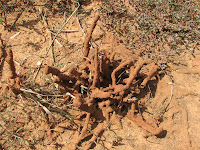Is There a Best Way to Remove a Tick?
For me, ticks are nasty things. They creep up on you, stick their entire mouthparts into your skin and just start sucking. You usually don't even feel them until you run your hand across your skin and feel something stuck to it. Ticks are NOT my favorite arthropod.
With hunting season in full force, many people are spending time outdoors in prime tick territory. Cold weather may slow them down, but they are still around, and as soon as you shoot your deer, they are going to leave that now cold body, for your warm one!
Is there a "best" way to remove a tick? There is, but it isn't easy. Ask around and people will say to use petroleum jelly or a match to get them out. Although it may be easy to slather Vasoline all over your tick, it will actually irritate them more and cause them to hunker down further into your skin. Same thing for using a recently extinguished match. Plus you run the risk of burning yourself.
The best way to remove ticks are to grasp them as close to the skin as possible and pull gently. If you hear a snap, you've popped off the head and the mouthparts are still stuck in your skin. Get ready for a little infection that will last at least until the mouthparts work their way out. Tweezers work fine, but you can also find special products meant for tick removal that work even better. These can be found on the Internet or through outdoors stores.
If you think you've been around an area where ticks may be hiding (areas with lots of brush and wildlife), do a thorough tick check. Check areas where the clothes fit tight - around the ankles, waist, under arms, groin. But, also check everywhere. Both times I've come into contact with ticks, they have been on my neck, and others I know have found them behind the ears. Just be thorough and remove them as soon as you can.
Ticks can spread diseases such as Lymes or Ehrlichiosis, so watch the bite area well and look for rashes on the body. If you suspect anything, go to the doctor to get checked out. Usually, early intervention of these diseases will prevent any major damage.
For more information on ticks, visit the Texas AgriLife Extension bookstore. View publication: E-150 "Tick Control".
With hunting season in full force, many people are spending time outdoors in prime tick territory. Cold weather may slow them down, but they are still around, and as soon as you shoot your deer, they are going to leave that now cold body, for your warm one!
Is there a "best" way to remove a tick? There is, but it isn't easy. Ask around and people will say to use petroleum jelly or a match to get them out. Although it may be easy to slather Vasoline all over your tick, it will actually irritate them more and cause them to hunker down further into your skin. Same thing for using a recently extinguished match. Plus you run the risk of burning yourself.
The best way to remove ticks are to grasp them as close to the skin as possible and pull gently. If you hear a snap, you've popped off the head and the mouthparts are still stuck in your skin. Get ready for a little infection that will last at least until the mouthparts work their way out. Tweezers work fine, but you can also find special products meant for tick removal that work even better. These can be found on the Internet or through outdoors stores.
If you think you've been around an area where ticks may be hiding (areas with lots of brush and wildlife), do a thorough tick check. Check areas where the clothes fit tight - around the ankles, waist, under arms, groin. But, also check everywhere. Both times I've come into contact with ticks, they have been on my neck, and others I know have found them behind the ears. Just be thorough and remove them as soon as you can.
Ticks can spread diseases such as Lymes or Ehrlichiosis, so watch the bite area well and look for rashes on the body. If you suspect anything, go to the doctor to get checked out. Usually, early intervention of these diseases will prevent any major damage.
For more information on ticks, visit the Texas AgriLife Extension bookstore. View publication: E-150 "Tick Control".


Comments